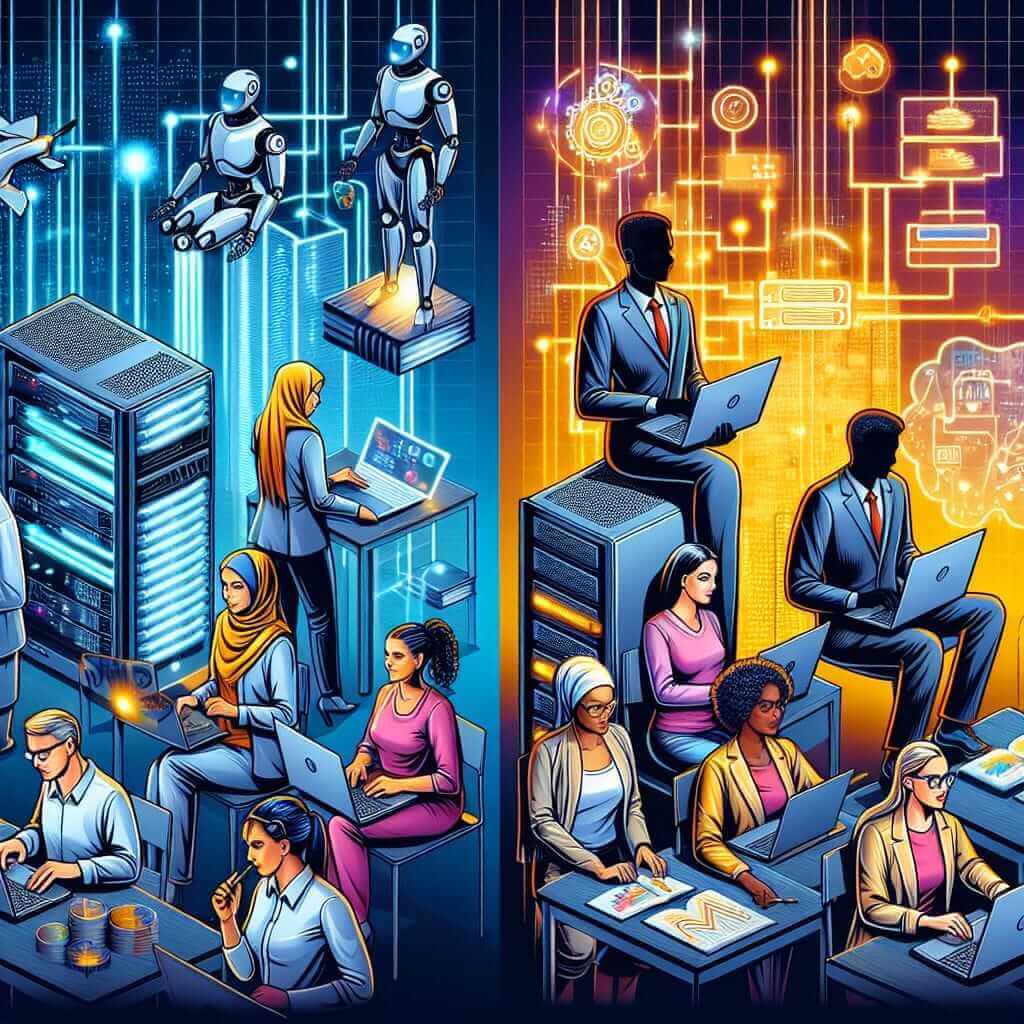Digital transformation, a hot-button topic with far-reaching consequences, frequently appears in IELTS Writing Task 2. This essay will delve into the impacts of digital transformation on industries, providing a comprehensive guide to help you excel in your IELTS exam. We’ll analyze common exam questions, dissect a sample question, and craft a band-8 worthy response, complete with vocabulary analysis and writing tips.
Sample IELTS Questions
Based on past IELTS exams and current trends, here are some potential essay prompts related to digital transformation and its impact on industries:
- Many industries are undergoing significant transformation due to the rise of digital technologies. What are the main impacts of this trend on businesses and workers?
- Digital transformation has revolutionized the way we work and do business. Discuss the advantages and disadvantages of this phenomenon.
- Some argue that digital transformation widens the gap between the rich and the poor. To what extent do you agree or disagree?
Sample Essay Analysis
Let’s break down the first question:
Many industries are undergoing significant transformation due to the rise of digital technologies. What are the main impacts of this trend on businesses and workers?
Type: Two-sided discussion essay
Keywords: digital technologies, industries, businesses, workers, impacts
Analysis: This question requires you to discuss the impacts of digital transformation from two perspectives: businesses and workers. You need to explore both the positive and negative consequences of this trend.
Model Essay
In today’s rapidly evolving technological landscape, digital transformation is sweeping across industries, ushering in a new era of doing business and fundamentally altering the employment landscape. This essay will delve into the profound impacts of this digital revolution on both businesses and workers.
On the one hand, businesses stand to reap significant benefits from embracing digital technologies. Automation, for instance, can streamline processes, enhance efficiency, and reduce operational costs. By integrating artificial intelligence and machine learning into their operations, businesses can gain valuable insights from data, enabling them to optimize their strategies, personalize customer experiences, and gain a competitive edge. Moreover, digital platforms have opened up a plethora of new markets and opportunities for businesses to expand their reach and connect with a global customer base.
On the other hand, the transition to a digital economy is not without its challenges for workers. Automation, while increasing efficiency, also raises concerns about job displacement, as machines and algorithms take over tasks previously performed by humans. This necessitates a shift in the skills demanded by employers, with a growing emphasis on digital literacy, data analysis, and critical thinking. Consequently, workers need to adapt and upskill to remain relevant in the digital age, which can be daunting for some.

In conclusion, the digital transformation of industries presents both opportunities and challenges for businesses and workers alike. While businesses can leverage digital technologies to optimize their operations and expand their reach, workers need to adapt to the evolving skills demand and navigate the potential risks of job displacement. Ultimately, a collaborative approach involving governments, businesses, and educational institutions is crucial to ensure that the benefits of digital transformation are shared by all members of society.
(Word Count: 277 words)
Writing Tips
- Structure: Follow a clear essay structure (introduction, body paragraphs, conclusion) to present your ideas logically.
- Vocabulary: Utilize topic-specific vocabulary (e.g., automation, digital literacy, data analytics) to demonstrate your language proficiency.
- Examples: Support your claims with relevant examples to enhance the clarity and persuasiveness of your arguments.
- Grammar and Accuracy: Pay close attention to grammar, spelling, and punctuation to avoid losing marks.
Vocabulary
- Digital Transformation (n.) /ˌdɪdʒɪtəl træns.fərˈmeɪ.ʃən/: The integration of digital technology into all areas of a business, resulting in fundamental changes to how businesses operate and deliver value to customers.
- Automation (n.) /ˌɔː.təˈmeɪ.ʃən/: The use of technology to perform tasks that were previously carried out by humans.
- Artificial Intelligence (n.) /ˌɑːr.tɪˈfɪʃ.əl ɪnˈtel.ɪ.dʒəns/: The theory and development of computer systems able to perform tasks that normally require human intelligence, such as visual perception, speech recognition, decision-making, and translation between languages.
- Machine Learning (n.) /məˈʃiːn ˈlɜːr.nɪŋ/: A type of artificial intelligence that allows software applications to become more accurate in predicting outcomes without being explicitly programmed to do so.
- Digital Literacy (n.) /ˌdɪdʒɪtəl ˈlɪt.ər.ə.si/: The ability to use digital technology, communication tools, and/or networks to define an information need, access, manage, integrate, evaluate, create, and communicate information.
Conclusion
Mastering the art of writing about complex topics like digital transformation is essential for achieving a high score in IELTS Writing Task 2. By understanding the nuances of the question, employing a clear structure, utilizing appropriate vocabulary, and supporting your arguments effectively, you’ll be well-equipped to impress the examiner. Remember to practice consistently and seek feedback to hone your writing skills.
Keep in mind that the impacts of digital transformation extend beyond just industries. You may encounter related essay questions concerning education, healthcare, or society as a whole. Broaden your understanding of the topic to confidently tackle any question that comes your way.